Some of us don’t have the luxury of reptile rooms. Some of us share our living space with others who aren’t reptile fanatics. It can be a challenge to provide appropriate caging for a moderately-sized reptile collection in public living space. It becomes even more challenging when the number and species of reptile waxes and wanes. After years of relative cage stability, I recently found myself playing musical cages due to some unexpected opportunities. Hopefully, my account will open up some possibilities for others wrestling with the same issues.
The Original Set-up
I’ve been able to accommodate more than 30 cages in my living room and dining room with what I feel is tasteful decor. Cages range from 10 gallon to 40 gallon size. The cages in question included the following:
18″x18″x18″ Exoterra with 1.3 gargoyle geckos (below left)
20″x10″x24″ front opening enclosure with l leachie (below center)
27 gallon bow front with 2 leopard geckos (see below)
24″x12″x24″ front opening enclosure with 1 gold dust day gecko (see below)
12″x12″x18″ Exoterra with 1 crested gecko (cage on left below)
Changes in the Air
My stable caging situation was shaken up when I got an offer I couldn’t refuse: an 18″x18″x24″ Exoterra with drainage layer, coco fiber and mesh liner cut to size for $70. This would make a wonderful new and more spacious home for the 3 gargoyles. The leachie could then move into the 18″x18″x18″ Exoterra. The new cage replaced the former leachie cage and the geckos had an uneventful move. This left the former leachie enclosure without a home.
Wait a minute! There was an empty space on top of my oak shelf unit that usually houses gargoyle hatchling tubs during breeding season. The front-opening enclosure fit that space very well and gave me an opportunity for a new acquisition: a month later, 3 red-eyed tree frogs joined the reptiles. These changes were possible because all 3 enclosures were similarly planted. The new tree frog enclosure was heavily planted and included an area that was cleared for a small pool.
New cage arrangement with leachie on left, gargs in center and tree frogs at top right
The next big change was due to my growing feeling that a 12″x12″x18″ enclosure was too small for my crested gecko, even though he has been living there for the past 8 years. He seems to have grown more active and makes a beeline for the outside of the cage every time I feed him. I looked desperately for a place to put another larger cage in my living room or dining room. No chance. I thought about moving the crested gecko into the bow front and putting the leopard geckos elsewhere, but it was difficult since the bow front is a top-opening enclosure. The only other solution that presented itself was to replace the bow front with a more crestie-friendly cage. An opportunity to purchase another 18″x18″x24″ Exoterra for only $50 sweetened the pot.
There was only one problem: I love my bow front leo cage with its bioactive substrate where crickets and super worms breed and supply endless dinner to the inhabitants. Finally, the solution presented itself (unfortunately after I had already bought the Exoterra): switch the crestie and the gold dust day gecko. Once again, both cages being already planted make this possible. The basking light moved with the gold dust to the smaller enclosure.
As an added bonus, now my two day geckos are next to each other for greater ease in care. Also, after years of not being able to find the gold dust in her huge cage, I can more easily see her in the smaller enclosure.
Conclusions
When the focus of a reptile collection changes, it’s worth looking at all possibilities to accommodate it in the space available. Sometimes another cage can be shoehorned in somewhere (I’ve certainly done that enough times). Sometimes a shift in the actual cages used is the best idea, and sometimes a shift in who inhabits which cage solves the problem. While there are a great variety of caging options, I have to say that the many sizes of Zoomed and Exoterra vivaria and the increasing appearance of used ones on places like Craigslist for relatively low prices has opened up a lot of options in providing a variety of attractive and correctly sized cages for a varied reptile population. Using removable heat and light sources, like Zoomed heat cable and halogen “puck” lights only increases the potential flexibility.


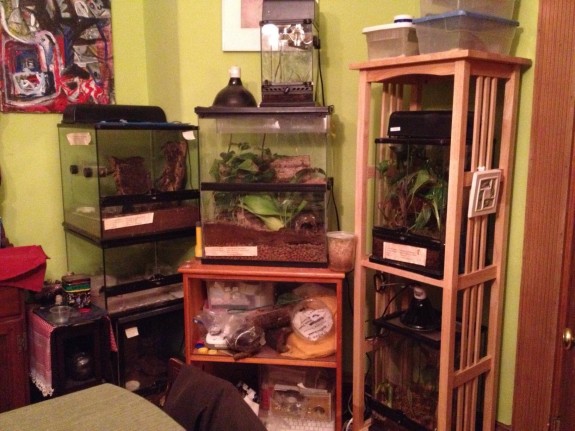
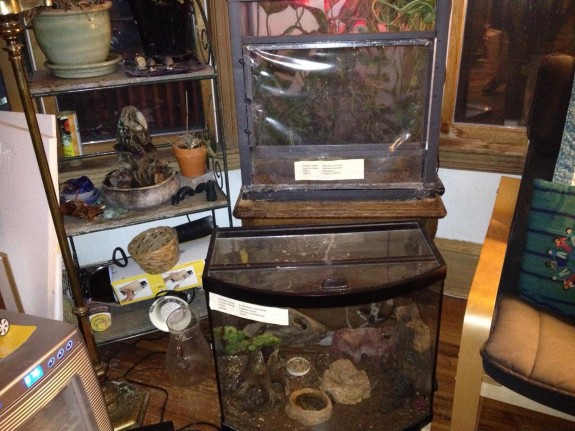
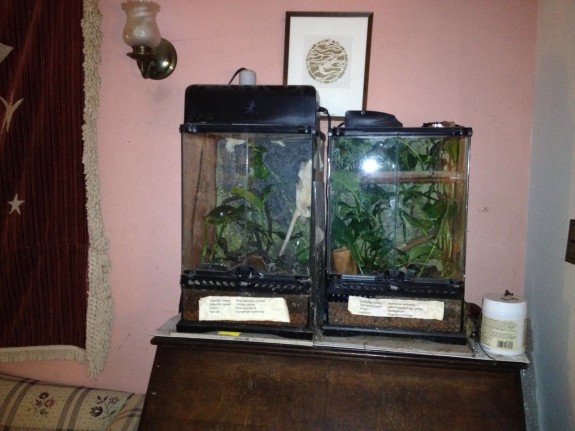
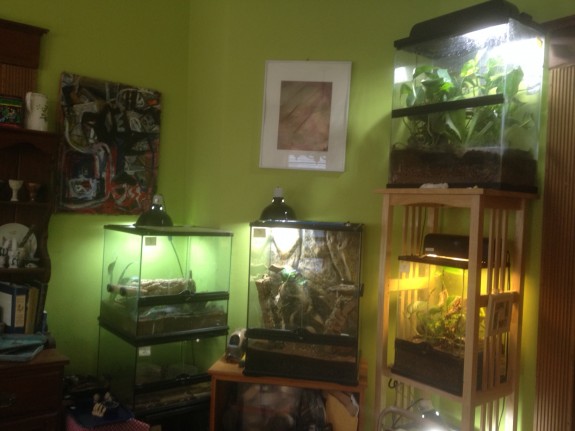
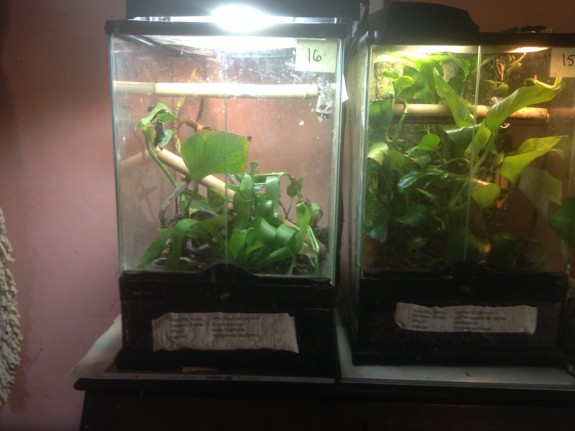
Aliza, I really enjoyed reading about your critter collection!